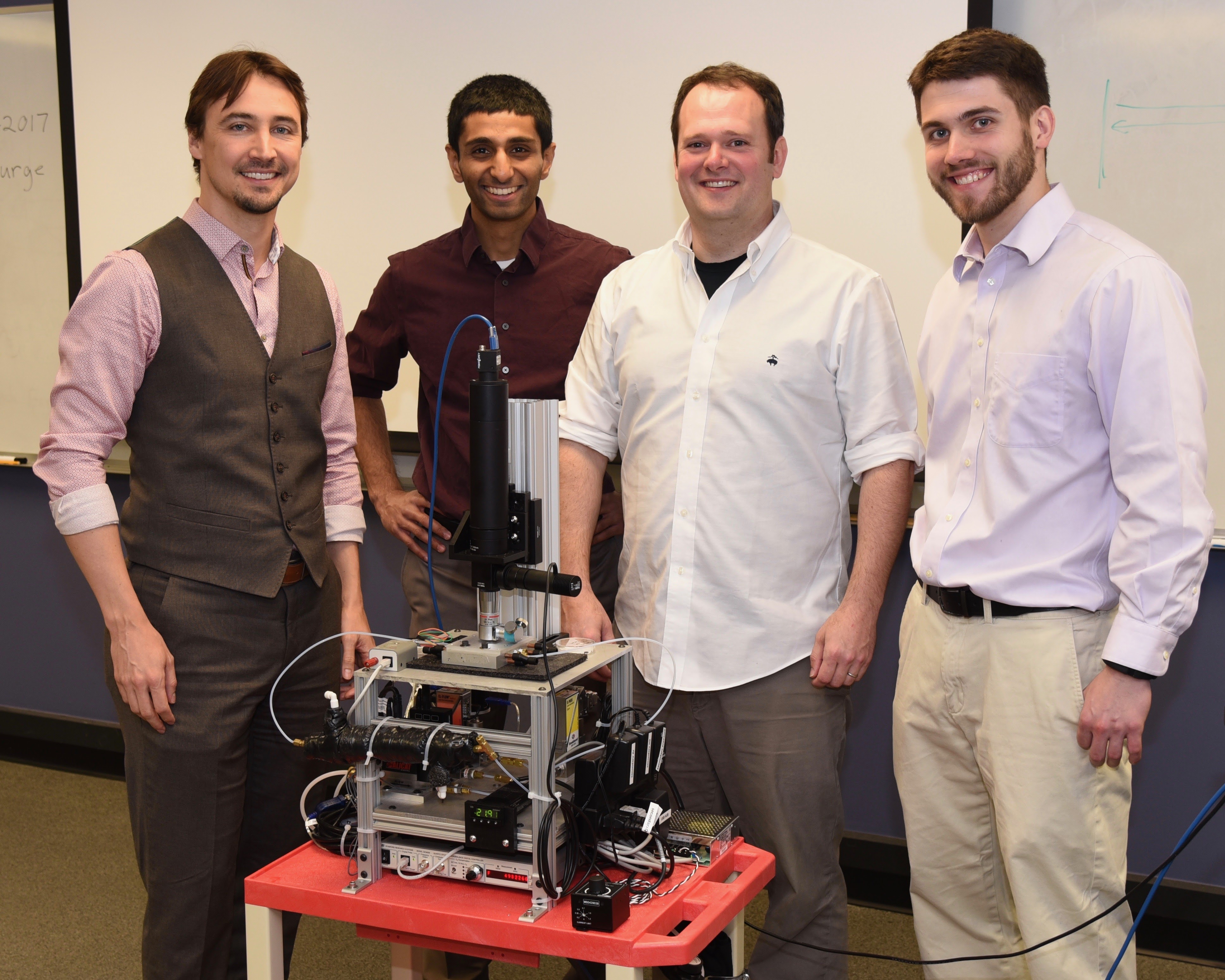Press Release
Scientists revisit the cold case of cold fusion
Four academic laboratories partner with Google to explore how materials science can help make fusion more accessible.
FOR IMMEDIATE RELEASE May 27, 2019
CONTACT:
Kara Stamets
301 405 4471
stametsk@umd.edu

University of Maryland team members (left to right): Jeremy Munday, Tarun Narayan, Joe Murray, and Kevin Palm. Photo credit: Matt Trevethick, Google Research.
Researchers from the University of Maryland (UMD) have collaborated with a team of scientists from the University of British Columbia, the Massachusetts Institute of Technology, the Lawrence Berkeley National Laboratory, and Google to conduct a multi-year investigation into cold fusion, a type of benign nuclear reaction hypothesized to occur in benchtop apparatus at room temperature.
A perspective published today in Nature publicly discloses the group’s collaboration for the first time.
The group, which included UMD associate professor of electrical and computer engineering Jeremy Munday, and about 30 graduate students, postdoctoral researchers and staff scientists, has not yet found any evidence of the phenomenon, but they did find important new insights into metal-hydrogen interactions that could impact low-energy nuclear reactions. The team remains excited about investigating this area of science and hopes their ongoing journey will inspire others in the scientific community to contribute data to this intriguing field.
Operating as a “peer group” with a stringent internal review process, the team started out by vetting previous claims of cold fusion, which have not been pursued in mainstream academic research for the past 30 years. If cold fusion could be realized, the heat released by this process might offer an attractive option for decarbonizing the global energy system.
The collaborative effort has produced nine peer reviewed publications and three arXiv posts. The team continues to search for a reproducible reference experiment for cold fusion.
Read the full perspective in Nature: “Revisiting the cold case of cold fusion,” Curtis P. Berlinguette (UBC), Yet-Ming Chiang (MIT), Jeremy N. Munday (UMD), Thomas Schenkel (LBNL), David K. Fork, Ross Koningstein and Matthew D. Trevithick (Google).
Quotes
“We need a fundamentally new energy technology that can be scaled within the span of a human lifetime. Achieving this goal requires scientists to be afforded the opportunity to do daring work. This program provided us with a safe environment to take the long shot – given the profound impact this could have on society, we should remain open to it even if there is an unknown probability of success.”
– Curtis Berlinguette, principal investigator and professor of chemistry and chemical and biological engineering at the University of British Columbia (UBC).
“If any research project ever met the definition of high-risk, high-reward, this would be the one. Electrochemistry can create interesting states of matter. If those states of matter help us in the search for new clean energy sources, all the better.”
–Yet-Ming Chiang, principal investigator and Kyocera professor of materials science and engineering at the Massachusetts Institute of Technology (MIT).
“This program explores several intriguing and overlooked problems with the potential for significant impact. Even if we do not find a better way to produce clean energy, our discoveries along the way will still shed new light onto a variety of areas in science and engineering.”
–Jeremy Munday, principal investigator and associate professor of electrical and computer engineering at the University of Maryland (UMD).
“We shouldn’t shy away from looking into areas that may have been written off. Not frivolously – but with new ideas and a recognition that there are things we don’t know and that we should be curious about.”
–Thomas Schenkel, principal investigator and interim director of the Accelerator Technology and Applied Physics Division at the Lawrence Berkeley National Laboratory (LBNL).
“Google cares deeply about data and sustainability. When we looked into the scientific record of cold fusion, we found some bold claims, but not a lot of current, credible data. Given the positive impact cold fusion could have if true, we saw an opportunity to help the situation. We are impressed with the research team that rose to this challenge, and are pleased with what has been accomplished so far.”
–Matt Trevithick, senior program manager at Google Research.